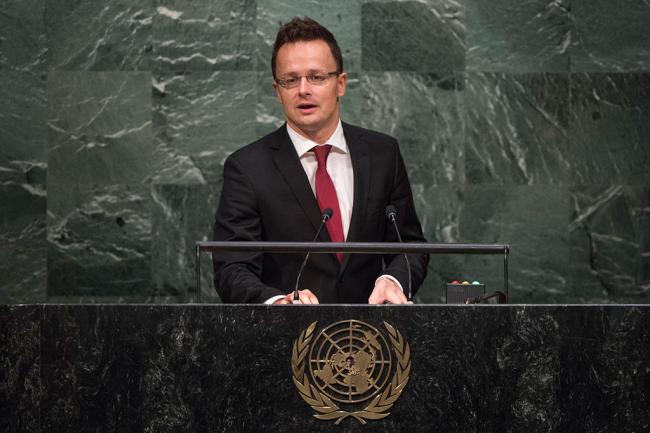
European leaders at UN Assembly highlight complexity of region's mass migration crisis
“During the last five years, we have witnessed 15 wars and armed conflicts, launched or renewed,” Minister Szijjártó stated. “And nowadays Europe has to face a war as well,” he added, referring to the conflict in Ukraine.
Turning to economic issues, the Hungarian politician said no one has to be an economist to see that the situation is “unsustainable,” noting that Europe contains 7 to 8 per cent of the world’s population, producing 15 to 16 per cent of the world’s Gross Domestic Product (GDP), while distributing “50 per cent of the world’s “social welfare spending.”
Meanwhile, he said mass migration had been the most difficult challenge, but that unfortunately “Europe has not been able to find the proper answers yet.”
“What we have been facing is not a refugee crisis, it’s much more than that and much more complicated than that,” he underlined, adding that Hungary is located on the most “intensive” migration route. “This mass migration is composed of asylum seekers, economic migrants, and also some foreign fighters, unfortunately,” he declared, adding that if Europe does not address the challenge now, it will have to face it in the future.
Furthermore, he stressed that the situation has resulted from a series of “bad international political decisions,” as well as from the Islamic State of Iraq and the Levant (ISIL) gaining additional territories.
“If we cannot get control over our borders, if we cannot decrease the influx, if we cannot decrease the pressure, then Europe can be destabilized as well – first the peripheries, and then even the centre – so I would like to stress again it’s a global challenge, that needs a global answer, global solution, based on global participation.”
He added that instead of addressing the consequences of conflicts, the UN must focus on stabilizing the situation, while Member States needed to put together a proposal to set quotas and ensure that Europe is able address the increase of services.
Meanwhile, in his remarks, the Permanent Representative of San Marino to the United Nations, Daniele D. Bodini, spoke about the global challenges of international migration and conflict.
“Every day we are witnessing the tragic migration from Africa and Asia towards Europe,” said Mr Bodini. “These desperate people leave their countries and their families behind to flee from conflicts, violence, and persecution. Thousands of them already died in the Mediterranean Sea.” He said that his county was pleased to see the organization of a high-level meeting on strengthening cooperation on migration and refugee movements to address the issue.
Bodini also spoke about Iraq and Syria, “where an ongoing inhumane ethnic and religious cleansing is carried out with unprecedented ferocity.” He said that he hoped that, a diplomatic solution would be achieved in the near future.
He also noted the need for Security Council reform, saying: “We believe that a reform of the Council shall include an enlargement in the category of non-permanent members and a more balanced geographical distribution,” he said, adding that he believed it should be achieved with “the widest possible consensus.”
UN Photo/Cia Pak
Support Our Journalism
We cannot do without you.. your contribution supports unbiased journalism
IBNS is not driven by any ism- not wokeism, not racism, not skewed secularism, not hyper right-wing or left liberal ideals, nor by any hardline religious beliefs or hyper nationalism. We want to serve you good old objective news, as they are. We do not judge or preach. We let people decide for themselves. We only try to present factual and well-sourced news.







